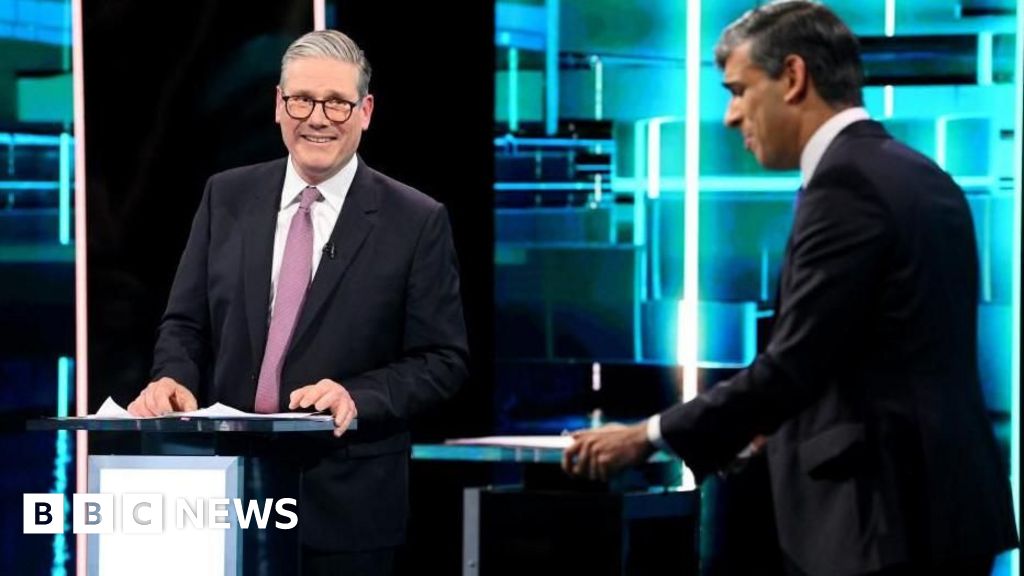World
Election TV debate: Six takeaways as leaders clash – BBC News

Image source, ITV/PA Media
- Author, Paul Seddon
- Role, Political reporter
Rishi Sunak and Sir Keir Starmer have squared off in their first televised encounter of the general election campaign so far.
Here’s what you need to know from the hour-long debate on ITV.
1. The prime minister went on the attack
Rishi Sunak has been in office for over a year and a half, and his party has been in power for 14 years.
But at times Mr Sunak sounded like the man in opposition, repeatedly challenging his Labour counterpart for answers over how he would enact his policies.
This included questions about how Sir Keir would resolve the NHS junior doctors’ strike and lower levels of illegal migration.
At times it got quite heated, with the prime minister speaking over Julie Etchingham, the ITV host, to ask his own questions of his opponent.
2. Starmer invoked Liz Truss to hit back
In response, the Labour leader tried to pull the focus back to the Tory record in government, adding Mr Sunak was “ashamed of the last 14 years”.
He was also very keen to talk about someone not in the studio: Mr Sunak’s immediate predecessor in No 10, Liz Truss.
The Labour leader brought up the former PM’s ill-fated 49-day premiership just seven minutes in, and made regular references to it as the debate continued.
This included talking about her during a section of the debate when he was asked how he would resolve the long-running NHS doctors’ strike.
But Sir Keir also sought to highlight frozen tax thresholds under the current government, branding the prime minister the “British expert on tax rises”.
3. They embraced the personal
The two leaders traded barbs over what they did before politics – with Sir Keir attacking the PM’s former career at a hedge fund, and Mr Sunak responding in kind with a dig over the Labour leader’s time as a lawyer.
But they were also keen to talk about their own backstories, as they tried to empathise with members of the audience and strike a chord with viewers at home.
Mr Sunak talked about the fact his dad was a GP and his mum a pharmacist during a section on the NHS. The Labour leader also brought up the fact his mum was a nurse.
Sir Keir also deployed his background when asked about the cost of living, talking about how the phone in his home was cut off when he was young.
And there was also a reference to the prime minister’s wealth – telling the audience at one point he “lives in a different world”.
4. They differed on private healthcare
A notable moment of difference came when both leaders were asked whether they would use private healthcare if a loved one were on a long waiting list for surgery.
Mr Sunak said he would, but Sir Keir said he wouldn’t.
And the Labour leader again talked about his family to illustrate the point.
“I don’t use private health. I use the NHS. That’s where my wife works, in one of the big hospitals; as I said it runs through my DNA,” he added.
5. Sunak really wanted to talk about tax
At almost every opportunity, the prime minister was keen to make one claim in particular: that Labour would put up taxes by £2,000.
That’s because a key attack line for the Tories is to say Labour is planning £38.5bn in “unfunded spending” – what they call the “equivalent” of £2,094 per working household over the next four years”.
It’s a claim that Labour rejects, because the figures are based on assumptions provided by Tory political advisers.
Sir Keir initially didn’t get a chance to respond, with the debate moving on the first few times it was mentioned.
But when he did, he dismissed the figure as a “false readout” from “pretend Labour policies”.
6. They struck different tones on the ECHR
The PM was asked if he would pull the UK out of the European Convention on Human Rights (ECHR) if his Rwanda deportation policy doesn’t work.
Flights carrying asylum seekers to the African nation were halted at the last minute in 2022 after legal challenges, which some Tories have argued shows the need to withdraw from the agreement.
Mr Sunak replied he would “choose our country’s security every single time” if “forced to choose” between “securing our borders and our country’s security, or a foreign court” – but didn’t say a pledge to leave would be in the Tory manifesto.
But there was a full-throated defence of the convention from Sir Keir, adding he wanted the UK to be a “respected player on the world stage, not a pariah”.
Interestingly, both of their answers garnered rare applause from members of the studio audience.







:max_bytes(150000):strip_icc()/roundup-writereditor-loved-deals-tout-f5de51f85de145b2b1eb99cdb7b6cb84.jpg)


